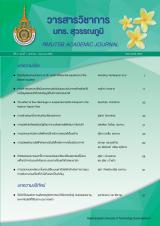การผลิตไบโอดีเซลด้วยปฏิกิริยาทรานส์เอสเทอริฟิเคชันจากไขมันไก่
Main Article Content
Abstract
บทคัดย่อไม่สมบูรณ์
Biodiesel production by transesterification from chicken fat
Nowadays, the biodiesel is a biofuel that has been encouraged to increase the production due to it can use to replace the diesel fuel. However, as the high price of raw materials and catalysts, this research was using the chicken fat as the raw material and CaO from calcined chicken bones as a heterogeneous catalyst. In addition, these materials will be contributed to reduce the cost of the production and eliminate wastes. For the best results, it was compared with the homogeneous catalyst which was NaOH and reacted with the transesterification of chicken oil. Furthermore, the results showed that the optimum conditions in the reaction is the methanol: oil molar ratio of 12:1, 4 %wt CaO, the reaction temperature of 60oC for 2 hrs which yield 61 % methyl ester when compared with NaOH yield 93 % methyl ester. Therefore, when compared with the NaOH, it was produced 93 % yield of methyl ester because of NaOH was high alkaline leading to the better result in a catalyst. On the other hand, the reusable for the production of biodiesel was the advantage of the heterogeneous catalyst.
Article Details
Published manuscript are the rights of their original owners and RMUTSB Academic Journal. The manuscript content belongs to the authors' idea, it is not the opinion of the journal's committee and not the responsibility of Rajamangala University of Technology Suvarnabhumi


